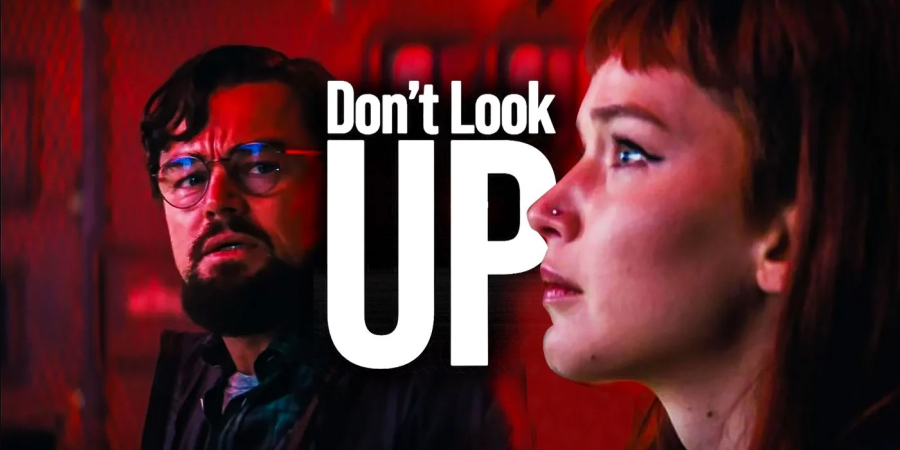Don’t Look Up: Movie Review
January 14, 2022
Don’t Look Up’s lack of subtlety has garnered the attention of many critics. While it seems a little too on the nose, it is perhaps necessary since society is so intent on ignoring what’s right in front of it. After all, how do you convince someone to see the truth when they hold the blindfold over their own eyes?
In summary, the film focuses on Kate Dibiasky (Jennifer Lawrence) and Randall Mindy (Leonardo DiCaprio), two scientists who are trying to warn the world of Comet Dibiasky (named after Kate, since she was the one to discover it). The comet is, in other words, a planet-killer, and without the intervention of the US or other world powers, the earth could very well be destroyed.
The film is an allegory for many things, but its main purpose is to convey the stupidity and stubbornness of the public to deny common-knowledge crises, such as climate change and COVID, and to illustrate how the capitalistic greed of the power elite is detrimental to general welfare.
When a global superpower colludes with members of the power elite, such as an Elon Musk persona, and puts personal gain over the safety of everyone they’re responsible for–everyone they have a duty to serve–they become the reason for global crises.
Am I talking about Don’t Look Up or our current reality? Though the comparison may be clear cut, the lines between Don’t Look Up’s reality and ours is blurred and muddied. And, perhaps, it says a lot about our concept of what is okay and what isn’t if we’re allowing our reality to resemble that of an apocalyptic science fiction film.
In the film, the US president (played by Meryl Streep) is responsible for the death of the entire world because she puts economic gain over the safety of literally everyone else. It’s no surprise that she ends the film safe and sound while the rest of the world decidedly . . . isn’t.
It’s even more telling during the beginning of the film when Kate and Randall are brought to see the president to discuss their findings. Unsurprisingly, the president is of no help because she is more worried about midterms. She only agrees to help stop the comet when it benefits her campaign. However, even after she agrees to help, the aid is put on hold. When Kate and Randall realize that the US will never inform the world of its coming demise, they know what they have to do: take the information public.
Kate and Randall are both equally qualified to inform the world about the comet. Therefore, they are brought onto a morning show called The Daily Rip to talk about the incoming crisis. Kate is astounded and abhorred when the hosts make light of the situation. She gets angry and explosive–as anyone would, arguably–and is subsequently labeled the hysterical woman. All the while, Randall is beloved by both the audience and the hosts, to the point where he is invited to return to the morning show while Kate is not.
While this seems like an exaggeration, it evinces just how differently women and men are treated by society and the media. Men can show emotion and are labeled as passionate, whereas women showing emotion are “unstable” or “hysterical”.
When Kate gives up, many would further label her as weak, citing that if she truly cared about the future of humanity, she would keep fighting. However, this begs the question: why would she fight for a world that mocks her passion? Why would she fight when there is no chance of victory? After all, the film reveals how civil unrest doesn’t hold a candle to the power elite’s bonfire.
This film isn’t just a critique on the public’s response to very real threats, it’s also a social commentary. The fact that the critics and the general public alike think that the message was too obvious is downright laughable, and they both must reevaluate our current social, political, and economic climates. The people of today’s world have literally denied science, so how can you expect them to have critical thinking skills? Subtlety in allegorical films is a thing of the past because people have simply become too stupid to understand hidden meanings they should have learned in freshman English.





